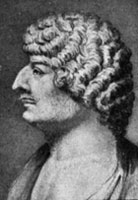A Bucolic Betwixt Two;Lacon And Thyrsis Poem by Robert Herrick
A Bucolic Betwixt Two;Lacon And Thyrsis
LACON. For a kiss or two, confess,
What doth cause this pensiveness,
Thou most lovely neat-herdess?
Why so lonely on the hill?
Why thy pipe by thee so still,
That erewhile was heard so shrill?
Tell me, do thy kine now fail
To fulfil the milking-pail?
Say, what is't that thou dost ail?
THYR. None of these; but out, alas!
A mischance is come to pass,
And I'll tell thee what it was:
See, mine eyes are weeping ripe.
LACON. Tell, and I'll lay down my pipe.
THYR. I have lost my lovely steer,
That to me was far more dear
Than these kine which I milk here;
Broad of forehead, large of eye,
Party-colour'd like a pye,
Smooth in each limb as a die;
Clear of hoof, and clear of horn,
Sharply pointed as a thorn;
With a neck by yoke unworn,
From the which hung down by strings,
Balls of cowslips, daisy rings,
Interplaced with ribbonings;
Faultless every way for shape;
Not a straw could him escape,
Ever gamesome as an ape,
But yet harmless as a sheep.
Pardon, Lacon, if I weep;
Tears will spring where woes are deep.
Now, ai me! ai me! Last night
Came a mad dog, and did bite,
Ay, and kill'd my dear delight.
LACON Alack, for grief!
THYR. But I'll be brief.
Hence I must, for time doth call
Me, and my sad playmates all,
To his evening funeral.
Live long, Lacon; so adieu!
LACON Mournful maid, farewell to you;
Earth afford ye flowers to strew!
This poem has not been translated into any other language yet.
I would like to translate this poem